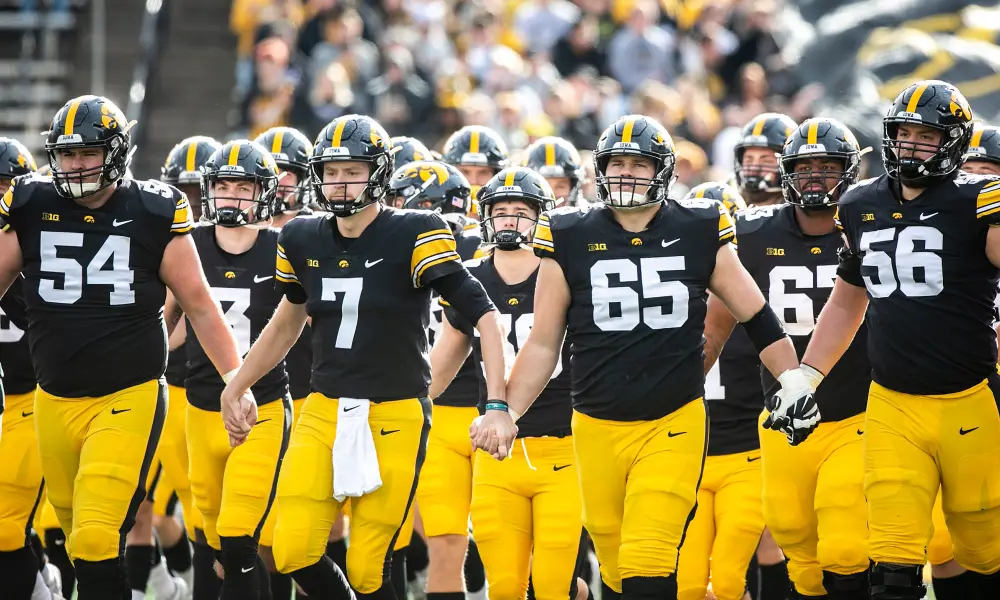Team History
The Iowa Hawkeyes football program has a rich history dating back to the late 19th century. The team’s early years were marked by a steady climb towards prominence. Despite some initial struggles, the Hawkeyes quickly established themselves as a force within the Western Conference (which later became the Big Ten Conference). They have remained a staple of the Big Ten ever since.
Since their inception, the Iowa Hawkeyes have experienced periods of dominance and occasional rebuilding phases. Their unwavering grit, the passion of their fan base, and their distinctive black and gold color scheme have become synonymous with Big Ten Football.
Foundation and Early Years
The Iowa Hawkeyes football program was officially formed in 1889, with their first game taking place that November. During these formative years, there were no established conferences, so the Hawkeyes competed mainly against other Iowa-based schools and neighboring teams. While the results were mixed in those early seasons, the foundation for future success was being laid.
By the early 1900s, the Hawkeyes had begun to establish themselves as a formidable program. They joined the Western Conference in 1899, and in the decades that followed, Iowa would start making a name for itself on the gridiron.
Notable Early Achievements
The 1920s brought significant success to Iowa football. In 1921 and 1922, the Hawkeyes went undefeated, earning them back-to-back mythical national championships. The team featured legendary players, showcasing their talent against some of the best college football programs in the country.
Iowa’s success during this period was further solidified when Nile Kinnick won the coveted Heisman Trophy in 1939. A remarkable athlete and scholar, Kinnick tragically lost his life during World War II, and Iowa’s home stadium was later renamed in his honor.
Periods of Change
Like many college football programs, the Iowa Hawkeyes have navigated ups and downs throughout their history. Following those early achievements, the team entered a prolonged period of relative mediocrity that lasted several decades. Despite this, the seeds of future success were planted during the tenure of Forest Evashevski (1952-1960) who laid the foundation for the winning tradition the program enjoys today.
The arrival of Hayden Fry as head coach in 1979 marked a significant turning point. Fry modernized Iowa’s approach, bringing flair and excitement to the program. His tenure transformed the Hawkeyes into a consistent Big Ten contender.
Championships and Achievements
The Iowa Hawkeyes have five claimed national championships throughout their history (1921, 1922, 1956, 1958, and 1960). They’ve also won or shared the Big Ten Conference Championship 12 times. The Hawkeyes have made 34 bowl game appearances over the years, emerging victorious in many of those matchups.
Beyond team achievements, Iowa has produced numerous individual standouts. In addition to Nile Kinnick, several other Hawkeyes have claimed prominent national awards, and many have gone on to successful careers in the NFL.
Management and Coaching Staff
The Iowa Hawkeyes football program is led by experienced and respected figures in the world of college football. Head Coach Kirk Ferentz is one of the longest-tenured coaches in the nation and has guided the team to many successful seasons. He’s supported by a talented staff of assistant coaches, coordinators, and player development personnel.
Home Stadium Information
The Hawkeyes play their home games at the iconic Kinnick Stadium. Located on the University of Iowa campus in Iowa City, Kinnick Stadium boasts a capacity of over 69,000, creating an electric atmosphere on game days. The stadium has undergone several renovations over the years but maintains a classic feel that adds to the uniqueness of the Hawkeye football experience.
Kinnick Stadium is renowned for its passionate fan base, known as the “Hawkeye faithful.” The tradition of the “pink visitors’ locker room” has become a quirky but distinctive characteristic of the stadium.
-
*********** ***** ******* *** ***** ** ************ **** ********* *****dd.mm.yyyy 00:00 PM
-
****** *********** **** ** ***** ****** *** **** *** ******: ********* *** ******* *** ****'* ****dd.mm.yyyy 00:00 PM
-
*********-***** ********: **** 6 **** *** ***** *** * ********* **** 7dd.mm.yyyy 00:00 PM
-
**********-************ *******: ****** ****ć, ******* *******, *** * ********* ********** ********dd.mm.yyyy 00:00 PM
-
********* **** ********* ** *** ***: ********* *** ********* ** ****** ******** **. *** *** *****dd.mm.yyyy 00:00 PM
-
****************** ******* **********: *** ********' **** ****dd.mm.yyyy 00:00 PM







